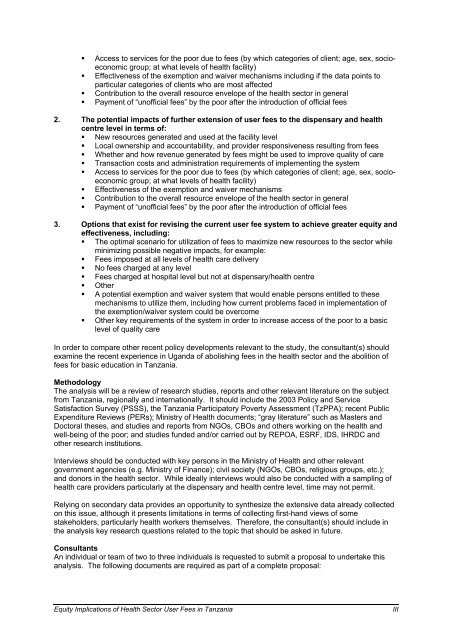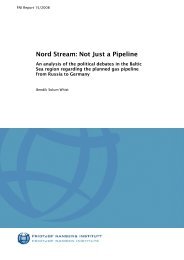equity implications of health sector user fees in tanzania
equity implications of health sector user fees in tanzania
equity implications of health sector user fees in tanzania
Create successful ePaper yourself
Turn your PDF publications into a flip-book with our unique Google optimized e-Paper software.
� Access to services for the poor due to <strong>fees</strong> (by which categories <strong>of</strong> client; age, sex, socioeconomic<br />
group; at what levels <strong>of</strong> <strong>health</strong> facility)<br />
� Effectiveness <strong>of</strong> the exemption and waiver mechanisms <strong>in</strong>clud<strong>in</strong>g if the data po<strong>in</strong>ts to<br />
particular categories <strong>of</strong> clients who are most affected<br />
� Contribution to the overall resource envelope <strong>of</strong> the <strong>health</strong> <strong>sector</strong> <strong>in</strong> general<br />
� Payment <strong>of</strong> “un<strong>of</strong>ficial <strong>fees</strong>” by the poor after the <strong>in</strong>troduction <strong>of</strong> <strong>of</strong>ficial <strong>fees</strong><br />
2. The potential impacts <strong>of</strong> further extension <strong>of</strong> <strong>user</strong> <strong>fees</strong> to the dispensary and <strong>health</strong><br />
centre level <strong>in</strong> terms <strong>of</strong>:<br />
� New resources generated and used at the facility level<br />
� Local ownership and accountability, and provider responsiveness result<strong>in</strong>g from <strong>fees</strong><br />
� Whether and how revenue generated by <strong>fees</strong> might be used to improve quality <strong>of</strong> care<br />
� Transaction costs and adm<strong>in</strong>istration requirements <strong>of</strong> implement<strong>in</strong>g the system<br />
� Access to services for the poor due to <strong>fees</strong> (by which categories <strong>of</strong> client; age, sex, socioeconomic<br />
group; at what levels <strong>of</strong> <strong>health</strong> facility)<br />
� Effectiveness <strong>of</strong> the exemption and waiver mechanisms<br />
� Contribution to the overall resource envelope <strong>of</strong> the <strong>health</strong> <strong>sector</strong> <strong>in</strong> general<br />
� Payment <strong>of</strong> “un<strong>of</strong>ficial <strong>fees</strong>” by the poor after the <strong>in</strong>troduction <strong>of</strong> <strong>of</strong>ficial <strong>fees</strong><br />
3. Options that exist for revis<strong>in</strong>g the current <strong>user</strong> fee system to achieve greater <strong>equity</strong> and<br />
effectiveness, <strong>in</strong>clud<strong>in</strong>g:<br />
� The optimal scenario for utilization <strong>of</strong> <strong>fees</strong> to maximize new resources to the <strong>sector</strong> while<br />
m<strong>in</strong>imiz<strong>in</strong>g possible negative impacts, for example:<br />
� Fees imposed at all levels <strong>of</strong> <strong>health</strong> care delivery<br />
� No <strong>fees</strong> charged at any level<br />
� Fees charged at hospital level but not at dispensary/<strong>health</strong> centre<br />
� Other<br />
� A potential exemption and waiver system that would enable persons entitled to these<br />
mechanisms to utilize them, <strong>in</strong>clud<strong>in</strong>g how current problems faced <strong>in</strong> implementation <strong>of</strong><br />
the exemption/waiver system could be overcome<br />
� Other key requirements <strong>of</strong> the system <strong>in</strong> order to <strong>in</strong>crease access <strong>of</strong> the poor to a basic<br />
level <strong>of</strong> quality care<br />
In order to compare other recent policy developments relevant to the study, the consultant(s) should<br />
exam<strong>in</strong>e the recent experience <strong>in</strong> Uganda <strong>of</strong> abolish<strong>in</strong>g <strong>fees</strong> <strong>in</strong> the <strong>health</strong> <strong>sector</strong> and the abolition <strong>of</strong><br />
<strong>fees</strong> for basic education <strong>in</strong> Tanzania.<br />
Methodology<br />
The analysis will be a review <strong>of</strong> research studies, reports and other relevant literature on the subject<br />
from Tanzania, regionally and <strong>in</strong>ternationally. It should <strong>in</strong>clude the 2003 Policy and Service<br />
Satisfaction Survey (PSSS), the Tanzania Participatory Poverty Assessment (TzPPA); recent Public<br />
Expenditure Reviews (PERs); M<strong>in</strong>istry <strong>of</strong> Health documents; “gray literature” such as Masters and<br />
Doctoral theses, and studies and reports from NGOs, CBOs and others work<strong>in</strong>g on the <strong>health</strong> and<br />
well-be<strong>in</strong>g <strong>of</strong> the poor; and studies funded and/or carried out by REPOA, ESRF, IDS, IHRDC and<br />
other research <strong>in</strong>stitutions.<br />
Interviews should be conducted with key persons <strong>in</strong> the M<strong>in</strong>istry <strong>of</strong> Health and other relevant<br />
government agencies (e.g. M<strong>in</strong>istry <strong>of</strong> F<strong>in</strong>ance); civil society (NGOs, CBOs, religious groups, etc.);<br />
and donors <strong>in</strong> the <strong>health</strong> <strong>sector</strong>. While ideally <strong>in</strong>terviews would also be conducted with a sampl<strong>in</strong>g <strong>of</strong><br />
<strong>health</strong> care providers particularly at the dispensary and <strong>health</strong> centre level, time may not permit.<br />
Rely<strong>in</strong>g on secondary data provides an opportunity to synthesize the extensive data already collected<br />
on this issue, although it presents limitations <strong>in</strong> terms <strong>of</strong> collect<strong>in</strong>g first-hand views <strong>of</strong> some<br />
stakeholders, particularly <strong>health</strong> workers themselves. Therefore, the consultant(s) should <strong>in</strong>clude <strong>in</strong><br />
the analysis key research questions related to the topic that should be asked <strong>in</strong> future.<br />
Consultants<br />
An <strong>in</strong>dividual or team <strong>of</strong> two to three <strong>in</strong>dividuals is requested to submit a proposal to undertake this<br />
analysis. The follow<strong>in</strong>g documents are required as part <strong>of</strong> a complete proposal:<br />
Equity Implications <strong>of</strong> Health Sector User Fees <strong>in</strong> Tanzania III













